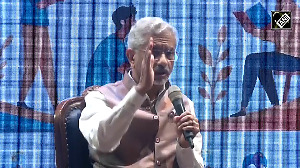Hafiz Saeed, the mastermind of the 2008 Mumbai attack and Jamat-ud-Dawa chief, was sentenced to 11 years in two terror financing cases on Wednesday, four days ahead of a crucial meeting of the Financial Action Task Force in Paris where Pakistan will present its case to escape from being blacklisted.

Saeed, a United Nations designated terrorist whom the United States has placed a $10 million bounty on, was arrested on July 17 in the terror financing cases. The 70-year-old fiery cleric is lodged at the high-security Kot Lakhpat jail Lahore.
Anti-terrorism court Judge Arshad Hussain Bhutta sentenced Saeed and his close aide Zafar Iqbal to five and a half years each and imposed a fine of Rs 15,000 in each case. A total of 11 years sentence will run concurrently.
Saeed and Iqbal were sentenced in two cases registered against them in Lahore and Gujranwala cities on the application of the Counter Terrorism Department (CTD) of Punjab police. Iqbal is the secretary of Al-Anfaal Trust.
The JuD chief was slapped with a prison sentence of five-and-a-half years and a fine of Rs 15,000 in each case. The sentences of both cases will run concurrently, Abdul Rauf Wattoo, a deputy prosecutor general said.
"Saeed remained calm and cool when the ATC judge announced the verdict," another court official told PTI.
Talking to reporters, Saeed's counsel Imran Fazal Gill said the verdict against the JuD chief was an outcome of the pressure of the FATF.
"We are disappointed over the ATC verdict and will challenge it in the LHC," he said. He said all the prosecution witnesses presented in the court could not prove any allegation against Saeed and Iqbal.
"This ATC verdict against Saeed and Iqbal has been given on weak grounds and we are hopeful to get relief from the high court,” Gill said.
The crackdown on Saeed's outfit last year followed a warning by the international terror financing watchdog to Pakistan to deliver on its commitments to curb terror financing and money laundering.
Interestingly, the court on Tuesday accepted Saeed's plea to club all six terror financing cases pending against him in the anti-terrorism court Lahore and announce the verdict on completion of the trial held amidst tight security.
However, Wattoo on Wednesday morning filed an application in the ATC requesting it to announce the verdict in two cases against Saeed.
Judge Bhutta accepted the prosecutor's plea. Saeed and Iqbal were brought to the ATC in high security to listen to the verdict, a court official told PTI.
The verdict comes four days ahead of the crucial meeting of the FATF from February 16 to 21 in Paris where Pakistan will present its case to get itself off the Grey List.
The FATF in October last decided to keep Pakistan on its 'Grey List' for its failure to curb funnelling of funds to terror groups like Lashkar-e-Taiba (LeT) and Jaish-e-Mohammad.
If not removed off the list by April, Pakistan may move to a blacklist of countries that face severe economic sanctions, such as Iran.
Since Pakistan continues to be in the FATF 'Grey List' , it would be very difficult for the cash-strapped country to get financial aid from the IMF, the World Bank, ADB and the European Union.
The FATF is backed by the UN Security Council passed resolutions which made its recommendations binding and in case of deficiencies, sanctions could be imposed.
Earlier, the anti-terrorism court in Lahore had reserved the verdict in the two cases against Saeed for February 8 after the completion of the trial.
Saeed will undergo imprisonment at the Kot Lakhpat jail where he has been detained since July last.
The four other terror financing cases are against Saeed, Iqbal, Yahya Aziz, Abdul Rehman Makki.
The anti-terrorism court or ATC had indicted Saeed and his close aides on December 11 in the terror financing cases.
On Saturday, judge Bhutta deferred the verdict in two terror financing cases till February 11.
In the two cases, the prosecution produced some 20 witnesses in the court who testified against Saeed and his close aides for their involvement in terror financing. Saeed pleaded "not guilty" in both the cases.
The CTD had registered 23 FIRs against Saeed and his accomplices on the charges of terror financing in different cities of the province.
The cases were registered against Saeed and others in Lahore, Gujranwala and Multan for collection of funds for terrorism financing through assets/properties made and held in the names of Trusts/Non Profit Organisations including Al-Anfaal Trust, Dawatul Irshad Trust, Muaz Bin Jabal Trust, etc.
According to the CTD, investigation launched into financing matters of proscribed organisations - JuD and LeT - in connection with implementation of UN Sanctions against these Designated Entities and Persons as directed by the National Security Committee in its meeting of January 1, 2019.
"These suspects made assets from funds of terrorism financing. They held and used these assets to raise more funds for further terrorism financing. Hence, they committed multiple offences of terrorism financing and money laundering under Anti Terrorism Act 1997," the CTD said.
Saeed-led JuD is the front organisation for the LeT which is responsible for carrying out the 2008 Mumbai attack that killed 166 people, including six Americans.
The US named Saeed as a Specially Designated Global Terrorist, and the US, since 2012, has offered a $10 million reward for information that brings Saeed to justice. He was listed as a terrorist under the UN Security Council Resolution 1267 in December 2008.











 © 2025
© 2025